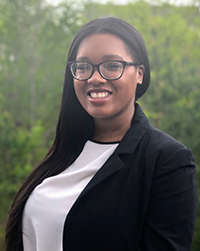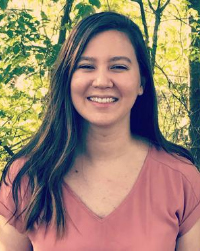William & Mary students make an impact as NBCC Fellows
Two master’s students and one doctoral student from W&M are serving minority communities through their work in the National Board for Certified Counselors (NBCC) Minority Fellowship program. The program selects counseling students from across the nation who are interested in working with underserved populations and helps the next generation of counselors become more culturally aware and responsive to the needs of various clinical populations.
 Hillary Reed M.Ed. ’21
Hillary Reed M.Ed. ’21
Hillary Reed is a master’s student in the addictions counseling program, and in addition to working with individuals with substance use histories, she is interested in working with military individuals and families.
As an NBCC Fellow, Reed has been working on a year-long project to explore her interests in working with the military population. Her project focuses on developing a curriculum for children in military families from elementary to high school.
Growing up in a military family, Reed has a personal understanding of what it is like to have a home base that is constantly changing. Children in military families move frequently, some moving 6 to 7 times throughout an individual’s childhood, which can be difficult for a child to navigate, Reed says.
In her experience, living in a military family helped her grow up faster than other children her age and she had to learn how to adapt to new environments and people. Naturally, she became interested in working with the military population as she began the counseling program.
In her first clinical experiences working with clients Reed also learned that she enjoyed working with children. When she was not working with clients, she researched counseling approaches for military populations and working with clients with PTSD. As she began working with children more, she realized that minority children who grew up in military families were not included in any of the research she found.
Through clinical experiences, research and personal connection, Reed has found her niche in working with children in military families who are minorities, specifically those who have adjustment disorders and PTSD.
She also knows the realities of finding safe spaces as a Black individual and understands the comfort that Black children have when talking with counselors who look like them.
“There are children who look like me who have PTSD but no one talks about it,” she says. “Kids want to talk to someone who looks like them, and I’ve been inspired to be that for children.”
Her work as an NBCC Fellow in creating a curriculum for military children will provide a foundation for her future work in the field as well as help others who may have little guidance working with such a population.
After Reed graduates, she hopes to continue working with children and students in group counseling. The personal meaning and fulfillment she finds in her work so far keeps her motivated in her quest to represent her community and offer a safe place for her clients.
 Conor Yeomans M.Ed. ’21
Conor Yeomans M.Ed. ’21
Conor Yeomans is a master’s student in the addictions track. He wants to work with men who have substance use disorders and have been released from incarceration. He is developing a four-part group counseling curriculum that helps men enter substance use programs as alternatives to incarceration.
For many of the men who Yeomans has experience working with, alternating between abusing drugs and serving time in jails has been a cycle that perpetuates itself, Yeomans says. Most of them do not have access to resources that could steer them in a different direction.
There are unique challenges for individuals with substance use backgrounds who have been incarcerated and the curriculum he is creating provides holistic care to a population that is largely underserved. Individuals who use substances struggle managing their money and legal histories are barriers to entering the workforce, Yeomans says. These factors can make it even more difficult for people in recovery to stay motivated to continue their treatment programs.
The curriculum will serve people in various stages of their recovery and offers a holistic treatment approach, including relapse prevention and maintaining sobriety after completing the program, financial literacy, mental health and wellness, and a career-oriented group that helps individuals find jobs based on their interests.
After Yeomans graduates he wants to become a licensed counselor and obtain his certification in substance use counseling. His goal is to work in an inpatient substance use treatment facility and work his way into a management position at a treatment program. His longer-term career is to become a clinical director at a substance use treatment facility.
His motivation to give back to people who struggle with substance use comes from personal and professional experiences, including working as the Men’s Home Director for Youth Challenge, a local drug and alcohol rehabilitation program.
“It is only natural for me to want to give back to people struggling with things that once consumed my life.”
 Stephanie Dorais Ph.D. ’21
Stephanie Dorais Ph.D. ’21
Stephanie Dorais, a doctoral student in counselor education and supervision at W&M, was one of 20 students to receive the doctoral-level award from NBCC.
Dorais has been working as a counselor in private practice for about five years, where she often works on acute cases of trauma with the college student population. Through her counseling experiences, she learned that she enjoyed working with college students and that there is a high need for therapy at the college age for many individuals because it is a time of great growth and change.
She is specifically interested in developing interventions for college students who are working through trauma, especially for the Asian American student population. As an NBCC Fellow she plans to collaborate with Asian counselors and professors on college campuses and offer accessible workshops for students that focus on mental health education and support.
“It meant a lot that experts in this field who have been doing this work for years believed in my idea enough to support it,” Dorais says of the encouragement she has received from mentors, professors and her cohort.
“As a student, you're not always sure if your ideas will work in real life. You actually never know until you go out and do the work. However, I had never received this kind of large-scale support before, and it inspires me even further to do meaningful work in the field.”